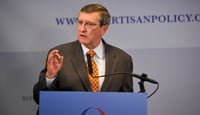 By Neal Ringquist and Tom Hawkins
By Neal Ringquist and Tom Hawkins
As we prepare to observe National Save for Retirement Week (also known as “National Retirement Security Week”), scheduled for October 16-22, it’s a great opportunity to remember why we, as individuals, need to save for our retirement. But the sobering reality is that we are all being called upon to save retirement itself—by rescuing a retirement system that doesn’t work for millions of hardworking Americans.
On one level, the answer is simple: each of us should just save more. But there are other, more systemic issues, such as economics, demographics, an under-funded Social Security system and a leaky defined contribution system. When you combine these intractable problems with a highly partisan political environment, the prognosis can be bleak.
Senator Kent Conrad’s Journey to Save Retirement
According to the ICMA-RC: “National Retirement Security Week commenced in 2006, when Senators Gordon Smith (R-OR) and Kent Conrad (D-ND) introduced the first resolution establishing National Save for Retirement Week. Their goals were to elevate public knowledge about retirement savings and to encourage employees to save and participate in their employer-sponsored retirement plans.”
Now, a decade later, former Sen. Conrad continues his leadership on the retirement front through his service on the Bipartisan Policy Commission, where he co-chairs (along with Sen. James B. Lockhart III) their 19-member Commission on Retirement Security and Personal Savings.
After two years of intense debate and deliberation, the Commission reached bipartisan consensus on the most critical initiatives required to strengthen retirement security and to effectively “save retirement” for millions of Americans.
The fact that Sen. Conrad’s Commission reached bipartisan consensus on so many difficult issues is no small feat.
On June 9, the Commission presented their recommendations in the report “Securing Our Financial Future: Report of the Commission on Retirement Security and Personal Savings.”
The report identifies six challenges for retirement security and personal savings, including:
- Too many Americans lack access to workplace retirement savings plans.
- Americans are increasingly at risk of outliving their savings.
- Home equity is underutilized in retirement—if it lasts until then.
- Many Americans lack the basic knowledge to manage their personal finances and prepare for retirement.
- Social Security is at a crossroads.
- Many Americans lack the income or resources to save for short-term needs—so they raid their retirement accounts (causing “leakage,” or the premature removal of assets from the retirement system).
The Problem of Leakage
As retirement services providers whose mission is to reduce cash-out leakage by helping plan participants move their balances forward when they change jobs, we at Retirement Clearinghouse were intensely interested in the Commission’s analysis and recommendations addressing the problem of retirement savings leakage.
We found a lot to like.
The Commission’s report:
- Correctly identifies cash-outs as the primary source of leakage, as opposed to loan defaults or hardship withdrawals, which debunks a popular misconception about retirement savings leakage.
- Hits the mark dead-on when it points out that participants with smaller balances are more likely to cash out their retirement accounts, citing cash-out statistics supplied by Vanguard.
- Accurately assesses the magnitude of the leakage problem at “hundreds of billions” each year.
If we were to quibble with anything in the Commission’s report, it would only be to temper slightly the notion that the majority of cash-out leakage is driven by economic hardship. Our research on America’s mobile workforce, performed in conjunction with Boston Research Technologies, suggests that post-separation, just over one-third of cash-outs are made for “emergency” purposes, when a participant has an urgent need for funds. Thus, almost two-thirds of cash-out leakage occurs for non-hardship reasons, and could be dramatically reduced if our retirement savings were portable, and participants could easily choose to consolidate their retirement savings as they changed jobs.
The sad reality is that billions of dollars of retirement savings are squandered every year, simply because job-changing participants’ easiest and most-tempting choice at the point of leaving their old employer and joining their new one was to cash out their retirement savings.
This lack of portability costs millions of Americans a timely and comfortable retirement. In fact, a 2012 Employee Benefit Research Institute (EBRI) projection model has shown that, if cash-out leakage were to be reduced by one-half, Americans would add $1.3 trillion to their retirement savings over just 10 years.
Shutting Off the Leakage
In the report’s recommendations, the Commission correctly establishes the linkage between retirement savings portability and reducing cash-outs. In testimony on September 7 before the Senate Committee on Aging, Sen. Conrad weighed in on the importance of portability, while offering some personal anecdotes, stating:
“Finally, we recommend the creation of a retirement security clearinghouse to ease the process of consolidating retirement plans. Let me just say, after leaving the Senate, one of the things I did was turn some attention to our own financial situation…my wife’s and mine. And what I found is that I’ve got accounts here…drib-drab…over here…you know, a little account over there. Most Americans face the same thing, and it would be a tremendous advantage if we were able to consolidate these plans.”
We couldn’t agree more with Senator Conrad, and we’re pleased that D.C. policymakers are beginning to realize the benefits that retirement savings portability can deliver in reducing cash-outs and thereby increasing retirement security for millions of Americans.
|We’re also gratified that specific portability initiatives such as auto portability are now moving forward, and have begun to receive the favorable attention of public policymakers, plan sponsors and service providers.
As Americans observe National Save for Retirement Week, we hope that they’ll not only consider how they can individually save for retirement, but how they can contribute to saving our retirement as well.
The Bipartisan Policy Committee’s retirement security recommendations are a great start.
